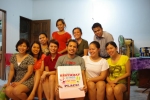poem worth sharing…
When I Became a Christian
by Adrian Plass
When I became a Christian I said, Lord, now fill me in,
Tell me what I’ll suffer in this world of shame and sin.
He said, your body may be killed, and left to rot and stink,
Do you still want to follow me? I said Amen – I think.
I think Amen, Amen I think, I think I say Amen,
I’m not completely sure, can you just run through that again?
You say my body may be killed and left to rot and stink,
Well, yes, that sounds terrific, Lord, I say Amen – I think.
But, Lord, there must be other ways to follow you, I said,
I really would prefer to end up dying in my bed.
Well, yes, he said, you could put up with the sneers and scorn and spit,
Do you still want to follow me? I said Amen – a bit.
A bit Amen, Amen a bit, a bit I say Amen,
I’m not entirely sure, can we just run through that again?
You say I could put up with sneers and also scorn and spit,
Well, yes, I’ve made my mind up, and I say, Amen – a bit.
Well I sat back and thought a while, then tried a different ploy,
Now, Lord, I said, the Good book says that Christians live in joy.
That’s true he said, you need the joy to bear the pain and sorrow,
So do you want to follow me, I said, Amen – tomorrow.
Tomorrow, Lord, I’ll say it then, that’s when I’ll say Amen,
I need to get it clear, can I just run through that again?
You say that I will need to joy, to bear the pain and sorrow,
Well, yes, I think I’ve got it straight, I’ll say Amen – tomorrow.
He said, Look, I’m not asking you to spend an hour with me
A quick salvation sandwich and a cup of sanctity,
The cost is you, not half of you, but every single bit,
Now tell me, will you follow me? I said Amen – I quit.
I’m very sorry Lord I said, I’d like to follow you,
But I don’t think religion is a manly thing to do.
He said forget religion then, and think about my Son,
And tell me if you’re man enough to do what he has done.
Are you man enough to see the need, and man enough to go,
Man enough to care for those whom no one wants to know,
Man enough to say the thing that people hate to hear,
To battle through Gethsemane in loneliness and fear.
And listen! Are you man enough to stand it at the end,
The moment of betrayal by the kisses of a friend,
Are you man enough to hold your tongue, and man enough to cry?
When nails break your body-are you man enough to die?
Man enough to take the pain, and wear it like a crown,
Man enough to love the world and turn it upside down,
Are you man enough to follow me, I ask you once again?
I said, Oh Lord, I’m frightened, but I also said Amen.
Amen, Amen, Amen, Amen; Amen, Amen, Amen,
I said, Oh Lord, I’m frightened, but I also said, Amen.








